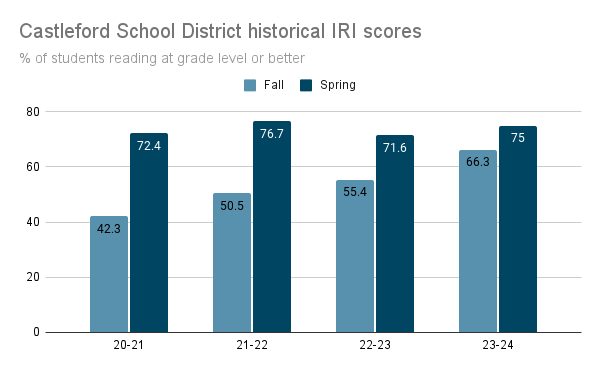Statewide, a record number of schools are offering full-day kindergarten — and more education leaders are pushing to expand preschool access.
This school year, nearly 90% of the state’s traditional school districts are offering full-day kindergarten. That’s up from 75% in 2021-22, the school year before an influx of additional state funding for early literacy started flowing to districts.
School leaders are also pushing to increase access to preschool. While most districts offer developmental preschool for students with disabilities, it’s unclear how many offer preschool to the general population, because these numbers are not reported to the state. However, a recent grant distribution has made the rising interest apparent.
The Blue Cross of Idaho Foundation for Health recently announced that 11 districts were awarded grants of about $50,000 each to help launch or expand early childhood education programs. Another 24 districts expressed interest in expanding their early education offerings and participated in a webinar series geared at helping school leaders do just that. The interest level was much greater than foundation senior program officer Jackie Yarbrough anticipated.
“This interest showed us that Idahoans value early education and want it available in their communities,” she said. “After many conversations with school administrators across the state, it was clear that funding to launch or expand preschool programs was desperately needed.”
The push for early education is notable in Idaho, where students are not required to attend kindergarten, where pre-K education is not funded, and where early learning has sometimes been a point of contention — as in 2021, when legislators rejected $18 million in federal funding for early childhood education.

As a new school year starts, here’s a look at the state of early education in Idaho.
More districts and charters than ever are offering full-day kindergarten
Kindergarten remains optional, and the state only provides enough funding for half-day programs. However, starting in 2022-23, school districts got an additional $47 million for early literacy (bringing the total to $72 million). Many districts have opted to put that money toward full-day kindergarten.
Today, more than 100 traditional school districts — nearly 90% — offer full-day, everyday kindergarten. Before increased early literacy funds were doled out, just 87 districts offered full-day kindergarten.

This school year, a dozen traditional school districts are not offering full-day kindergarten. Most are small and rural:
- Swan Valley Elementary.
- Grace.
- North Gem.
- Soda Springs.
- Prairie Elementary.
- Cottonwood.
- Salmon River.
- Kootenai.
- Kendrick.
- Madison.
- Rockland.
- Arbon Elementary.
Of the 57 charter schools and nontraditional districts that offer elementary education, 48 offer full-day kindergarten — about 83%.
This school year, nine charter schools are not offering full-day kindergarten:
- Victory Charter.
- Idaho Virtual Academy.
- Falcon Ridge Public Charter.
- Liberty Charter.
- Taylor’s Crossing Public Charter.
- Legacy Public Charter.
- Chief Tahgee Elementary Academy.
- Peace Valley Charter.
- Thomas Jefferson Charter.
Why it matters: Early childhood education can have long-term, positive benefits
Early learning advocates say kindergarten and preschool can have long-term, positive benefits for children. From birth to age 5, “children are laying the cognitive and behavioral foundation for the rest of their development and learning,” according to the Blue Cross of Idaho news release.
“Education and health outcomes are closely linked, and we know that academic and education success leads to better health outcomes,” Yarbrough said.
Jared Jenks, the superintendent at Sugar-Salem School District, said, “Providing educational opportunities for students at younger ages will do nothing more than help them to be better prepared for kindergarten and their future education.”
Sugar-Salem was awarded one of the Blue Cross Foundation’s $50,000 grants, which will be used to improve facilities and curriculum for its preschool program, which is supported through a partnership with Brigham Young University-Idaho in nearby Rexburg.
Chuck Day is the principal for the Castleford School District, which also secured a grant. The district has offered full-day kindergarten for more than 20 years, and is in its third year of offering half-day preschool for 4-year-olds. This school year, the preschool is adding a half-day program for 3-year-olds as well.
“That’s where it all begins, you have to have that early literacy foundation,” Day said. “If students don’t have phonemic awareness by the end of first grade, then they’ll struggle more with reading the rest of their educational career.”
Day and Dena Allred, Castleford’s superintendent, said a district-community partnership has driven the early learning programs.
“It’s been a breath of fresh air,” Day said of the Castleford community’s support for early learning.
Over the past four years, Castleford students in grades K-3 have outperformed state averages on the Idaho Reading Indicator, and shown growth during each school year.

Allred said the early learning programs are partly to credit for the high achievement levels, but so are the district’s teachers, paraprofessionals, and student support systems.
Idaho Education News data analyst Randy Schrader contributed to this report.
